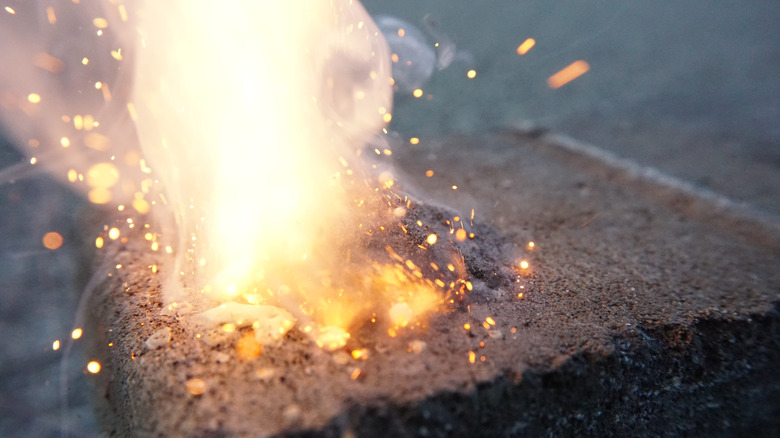The Truth About The Ironic Origins Of Gunpowder
One unfortunate condition of being human is that even our most noble intentions can sometimes lead to tragic results. In the early 20th century American sociologist Robert K. Merton finally put a name to the unplanned results of our ideas and actions: "unanticipated consequences of purposive social action." In a 1936 paper published in the American Sociological Review, he argued that human ignorance, error, and our tendency to get totally wrapped up in the moment sometimes have unintended outcomes that can be rather unpleasant. And every so often, one of those unanticipated consequences has the power to change the world.
Take gunpowder. According to Live Science, the explosive material revolutionized China's ability to defend itself against the invading Mongols from the north. They used it to turn their arrows into little rockets of flying fire. In Europe, it gave rise to a new type of soldier — the infantry — and the cannon, which rendered the walled city all but obsolete. Gunpowder became the most dangerous weapon man had invented and stayed that way for centuries until the unfortunately very purposive invention of the atom bomb. Despite is destructive reputation, however, the inventors of gunpowder had a much different use in mind when they began tinkering.
Gunpowder's inventors were looking for a way to prolong life
Rather than invented, gunpowder was rather discovered by alchemists in China sometime around A.D. 850. But they weren't hoping to come up with a new way to kill people. Ironically, the somewhat unlucky innovators were actually trying to invent an elixir that would prolong a person's life. Instead, they got something that has the power to drastically shorten one in an instant. The encyclopedia "Medieval Science, Technology, and Medicine" quotes a 9th-century Taoist text on alchemy that describes the dangerous unanticipated consequences of Chinese scientists' tinkering with a mixture of saltpeter, sulfur, a mineral called realgar, and honey (which would have contained the carbon necessary for the incendiary reaction). Those unfortunate scientists ended up making their discovery the hard way, for from the mixture "smoke and flames result, so that their hands and faces have been burnt, and even the whole house where they were working burned down."
In 1040 Chinese scholar Zeng Gongliang published the world's first formulae for gunpowder in his military compendium called the Wujing Zongyao, which is often translated into English as the "Complete Essentials for the Military Classics." The explosive was then shipped to the rest of the world via the Silk Road, and the rest is history. But hey, not all of the unanticipated consequences of those Chinese alchemists' experiments have been negative. At least we got fireworks out of the painful ordeal.

